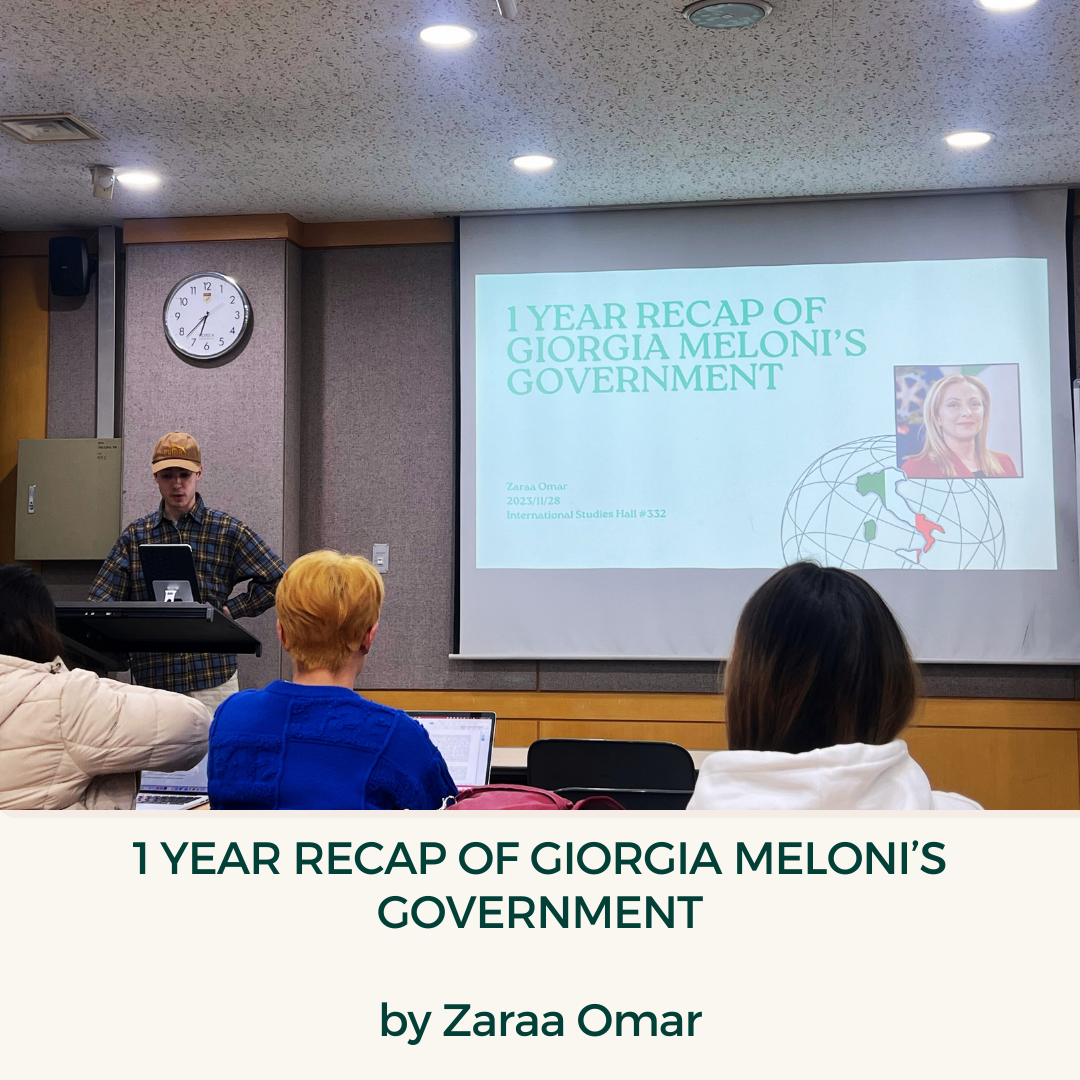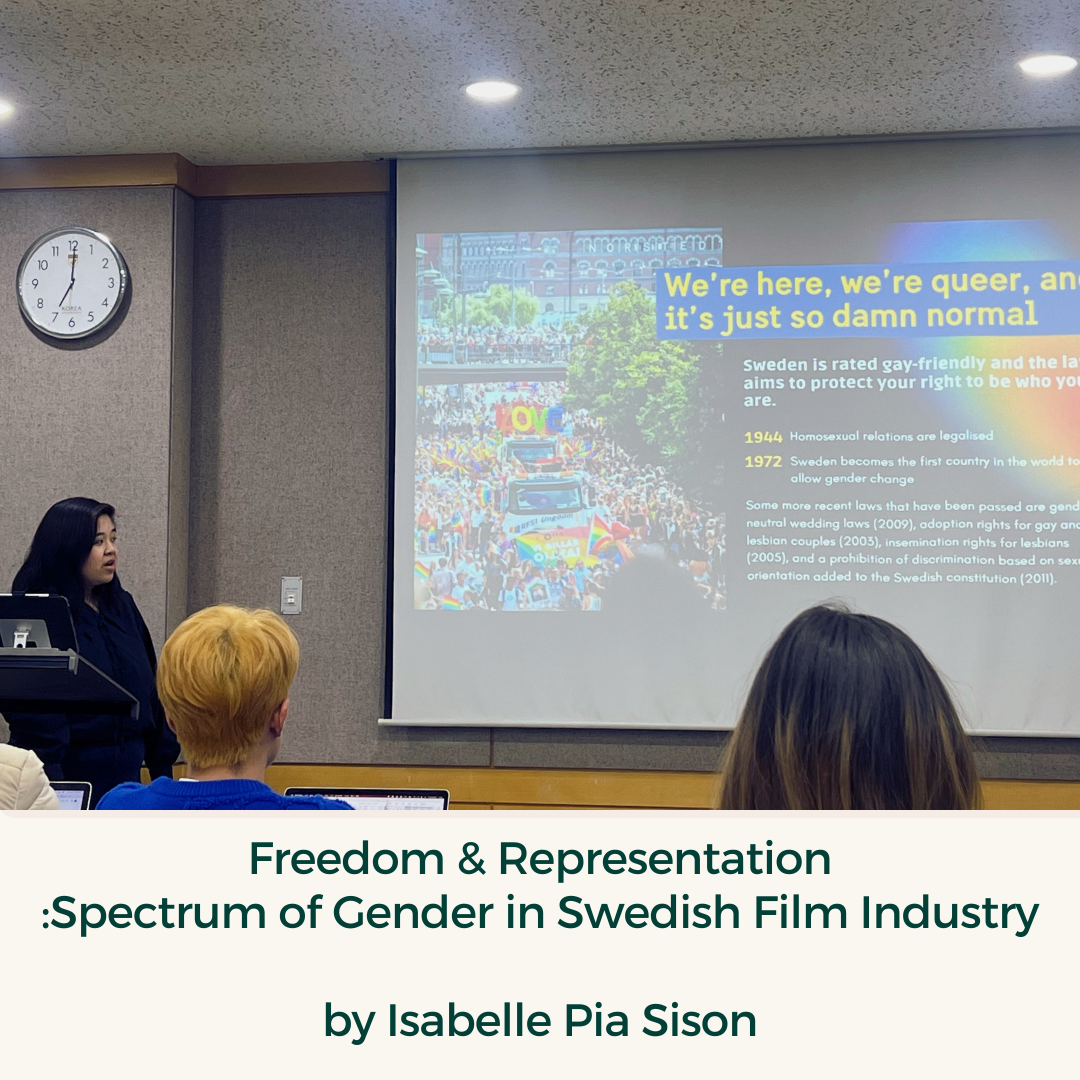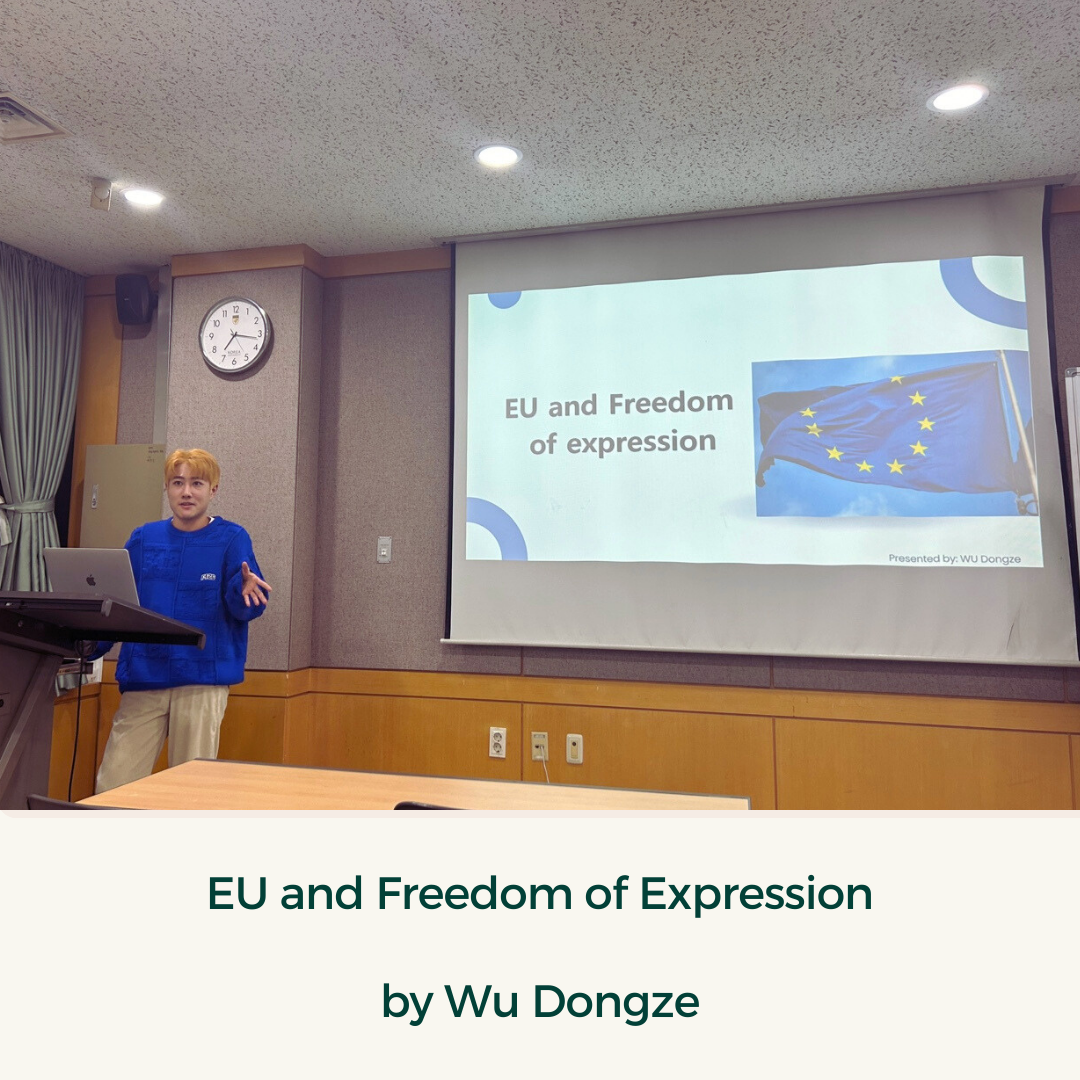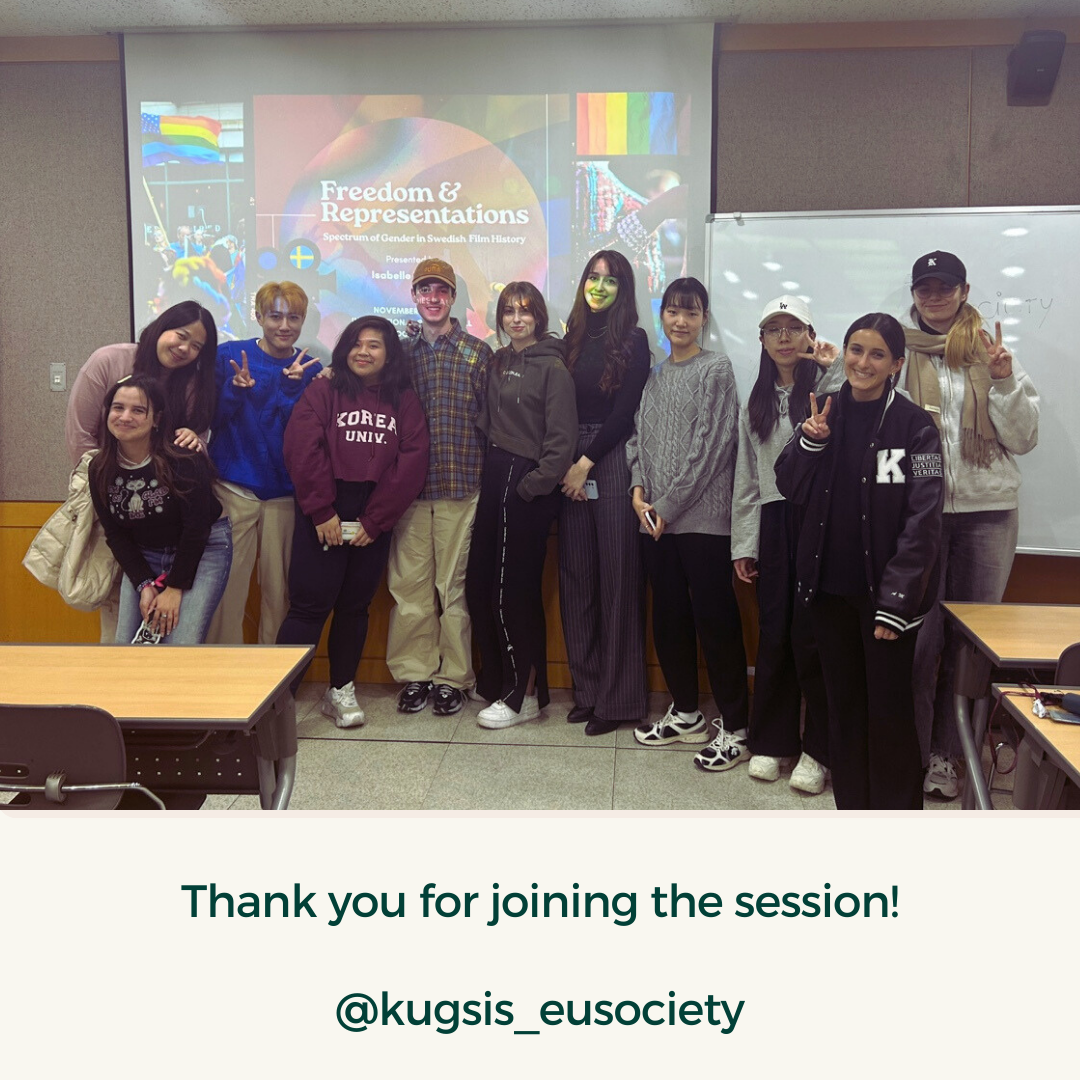2023-2 EU Society 8th Session (Nov 28, 2023)
페이지 정보

본문
The EU Society's Eighth Session began with fast greetings and the announcement that today will be our busiest meeting yet, as we will have the pleasure of listening to three presentations on fascinating themes given by our members.

The first one to break the ice, when it comes to presenting, was Omar Zaraa with his presentation “1-year Recap of Giorgia Meloni’s Government in Italy”. In the presentation, Omar provided us with a detailed examination of human rights issues in Italy, specifically focusing on immigrants’ rights, LGBTQIA+ rights, and women’s rights. This segment offered an initial introduction to the Italian government and its legal landscape.
● Immigrants’ Rights:
Omar highlighted a concerning trend of a nearly doubled influx of immigrants compared to previous years, primarily originating from Tunisia. Giorgia Meloni’s government attempted various measures to curb immigration, including controversial laws such as a naval blockade, a contentious pact with Tunisia, and a “legal migration decree.” These efforts extended the duration of immigrant stays in holding centers for repatriation, where severe human rights abuses were reported, notably in Libyan centers.
● LGBTQIA+ Rights:
Another important point which Omar emphasized was Italy’s position as the 34th country in respecting LGBTQIA+ rights. Disturbingly, the Gay HelpLine received 21,000 reports of abuse, with half of the callers identifying as transgender. Additionally, the government halted same-sex couples from registering their children at civil registry offices.
● Women’s Rights:
Discussion on women’s rights, predominantly tied to reproductive rights, highlighted the controversy surrounding the right to abortion. Challenges were evident, with many doctors in Southern Italy refusing to perform abortions. While stricter laws against domestic violence were introduced, funding for domestic violence prevention was reduced. Notably, the government declined to lower the tax on female hygiene products to 5%.
The ensuing discussion centered on the prevailing economic challenges impacting the prioritization of rights. With a struggling economy leading to fund cuts across sectors, a shift in focus was evident. Economic concerns took precedence, causing human rights and minority rights to take a backseat in policy priorities. Furthermore, many students were curious about how did Georgia Meloni come to power and if she is popular in Italy and, especially, among female voters. Luckily, in EU society, we have a number of Italian students which have highlighted the perceived failures of left-wing governments preceding Meloni’s tenure, ultimately resulting in the ascendancy of right-wing powers.

Pia Sison’s presentation “Freedom & Representations: Spectrum of Gender in Swedish Film History” traced the evolution of the spectrum of gender and its complexities. Pia told us that the inspiration for doing a presentation on this exact topic came from a previous KU alumni post, which showcased a short clip on Swedish gay history in film.
The presentation unveiled intriguing facets, such as that homosexual relations have been legalized in Sweden since 1944. Sweden, championing individual rights, legally allowed gender change in 1972, marking a groundbreaking global milestone. The narrative of cross-dressing in Swedish films dates back to 1914, revealing discomfort with accidental male-male kisses in mid-century Swedish comedies. Interestingly, comparing this to the rest of the world, cross-dressing was acceptable as long as individuals reverted to their assigned genders, even in a more conservative society like Korea.
Pia’s presentation further delved into the transient nature of gender change and highlighted transgender activism. The controversial Swedish documentary on trans-sexuality revealed Sweden’s paradoxical treatment of transgender individuals. Despite being the first country to permit legal gender correction, Sweden once mandated sterilization for gender affirmation surgeries, a policy that was only rescinded in 2013, with compensation offered in 2017 - which were very interesting fact to a majority of our society's members. This historical ambivalence extended to Swedish feature films, which gradually evolved when gender non-conforming individuals started producing films in 2012, resulting in more diverse and aesthetically rich representations, exemplified by the movie “She Male Snails”.
The discussion that followed Pia’s presentation majority focused on student’s own perspectives and views of their countries LGBTQIA+ rights and if they are being respected. When it comes to this topic, the members drew comparisons between Poland, Sweden, Serbia and Korea. Many of the students noted the reluctance in many countries to embrace differences, especially concerning laws related to marriage and adaptation.

Last but not the least to present for this EU meeting was Wu Dongze with his presentation “EU and Freedom of Expression”. As one might hint from the title, Denzel focused on the European Union’s leadership role in safeguarding freedom of expression. Denzel started off his presentation by highlighting the numerous institutional frameworks within the EU dedicated to protecting this fundamental right. The EU Charter of Fundamental Rights, the European Convention on Human Rights (ECHR), and the European Court of Justice (ECJ) were identified as pivotal institutions in upholding this freedom.
The presentation delved into two prominent case studies, beginning with Greece, where concerns over concentrated media ownership impeded diverse voices in the public sphere. Incidents of intimidation and physical attacks on journalists were highlighted, yet the EU’s response was perceived as inadequate. The second case study centered on Russia. Although not an EU member, the sanctions imposed on Russian journalists prevented them from publishing their work within Europe, violating their rights to defense, freedom of expression, and non-discrimination based on nationality.
The following discussion started off with the question “What do you think about the EU’s silence on media and freedom of expression violations in member state Greece, while sanctioning Russian media and journalists who are not even EU members?” EU Society members critically analyzed this contrast, questioning the EU’s stance and policies in addressing violations within its member states while taking action against non-member entities. Many of the members have further highlighted concerns over media censorship in Greece, especially after hearing about the violent attacks that journalists speaking out against the ruling party have faced. painting a picture of restricted freedom on television platforms.
After these three insightful presentations and the following discussions all of the members were invited to have the well deserved dinner together.

- 이전글2023-2 EU Society Participation in KSCES Fall Academic Conference (Oct 27, 2023) 23.12.11
- 다음글2023-2 EU Society 7th Session (Nov 21, 2023) 23.12.04
댓글목록
등록된 댓글이 없습니다.










